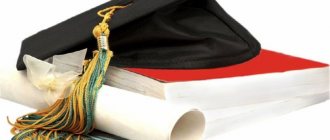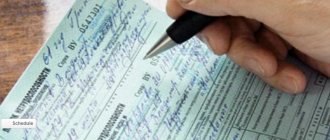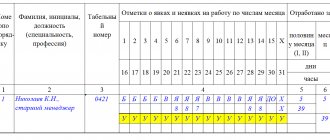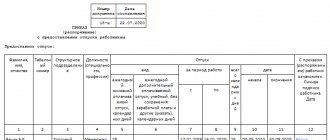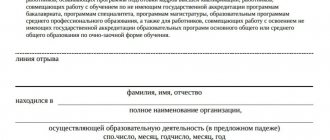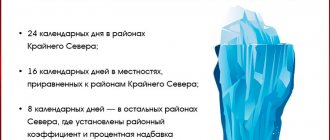Home / Labor Law / Vacation / Educational
Back
Published: 05/09/2017
Reading time: 6 min
1
1624
Not everyone who has received a higher education finds work in their profession, and some simply do not want to work in their field. If this happens, then two options appear: work where they will hire you or get a second higher education.
The Labor Code (Article 177) provides for the provision of paid study leave when receiving higher education for the first time. No such guarantees have been established in case of repeated training .
The decision to give a student leave for periods of sessions while receiving a second higher education or to refuse to provide it is in the hands of the employer. The bosses decide this based on their own interests. The situation is the same regarding payment for this vacation.
- When can leave be denied?
- When can you count on vacation? The employer himself sends you for training
- The employee studies on his own initiative to gain additional knowledge
Dear readers! To solve your problem, call hotline 8 or ask a question on the website. It's free.
Ask a Question
When can leave be denied?
If an employee began training on his own initiative and the employer is not interested in him receiving a diploma, then he will most likely be denied student leave.
In this case, there are two ways to solve this problem:
- training in your free time;
- receiving leave without pay.
If for the first option you do not need to negotiate with the employer, then for the second you will need his consent.
Leave at your own expense is granted only if there is a good reason for this. Examples of valid reasons are not listed by law, and therefore whether to grant leave or not is decided without particularly relying on anything.
Right to study leave
So who is right - the employee who demands leave for study, or the employer who refuses him this, and does the student have the right to unconditionally receive such leave?
Legislative basis
Article 177 of the Labor Code of the Russian Federation states that all benefits and compensations due to employees combining work with training are provided only if they receive education at this level for the first time or if the employer sent him to a university for a second diploma at a level the employee already has.
That is, the institution is not obliged to provide leave to pass the exam to someone who, on his own initiative, entered to study to obtain a second diploma, and has the right to refuse him this (even permission to take leave at his own expense).
If an employee is sent to a university by the organization in which he works, then he has the full right to receive all related benefits (study leaves, etc.). At the same time, the enterprise must draw up documents regulating the specifics of the relationship between the employer and the student employee:
- collective agreement;
- an individual employment contract that specifies the rights and obligations of the parties, including a training agreement.
Possibilities
It is possible to circumvent the law and receive student leave in the following cases:
- If you have diplomatic talent and can convince the employer to let you go for the duration of the session period, at least at your own expense.
- If the second higher education will be counted as an increase in professional educational level.
Modern higher education is divided into stages - bachelor's and master's degrees, which are different levels of education, regardless of the professional direction of each of them. Having a bachelor's degree, it is quite possible to study in another specialty in a master's program, while having all the benefits of a student studying at a university for the first time, including the right to leave.
When can you count on vacation?
The employer himself sends for training
If the employer himself sends an employee for additional training, then they can enter into an agreement on this, which will stipulate all the necessary conditions.
A common practice is when an employer, sending an employee for training, takes on all the costs associated with this (payment of training costs, travel, accommodation, business trips). A vacation such as a business trip is issued and the employee is paid a salary for its period.
In return for such training, the employee undertakes not to resign for several years, and in the event of dismissal, to compensate the employer for the costs incurred for his education, on a proportional basis to the period not worked.
When using this scheme, admission to a university and registration of leave will consist of the following stages:
- Concluding an agreement with the employer on sending for training.
- Sending documents to an educational institution and enrollment in it.
- Obtaining information about the period during which the training will take place and documentary notification of this to the employer.
- Payment by the employer of the cost of studying at the university.
- Calculation and issuance to the employee of funds necessary for his training, for example, payment of travel, accommodation and daily allowance (if training takes place in another city).
- An employee’s report on the results of the training completed (results of tests and exams) and the funds spent (by providing receipts).
If there is extra money left, then it must be handed over to the cashier , and if a debt has arisen on the part of the employer (the money issued was not enough), then it is necessary to write a statement indicating the amount of funds spent in excess of the limit and the reason for the excess.
It should be noted that only employees who successfully complete the curriculum and successfully pass the final exams can count on tuition fees and student leave.
The employee studies on his own initiative to gain additional knowledge
The employee enters an educational institution and pays for the training himself in order to obtain additional knowledge and a diploma, which he needed to continue working with the same employer as before.
In this case, if an agreement has been concluded with the employer on the provision and payment of student leave when the employee receives a second education, or this point is provided for in the local acts of the enterprise, then the employee will receive both leave and payment.
The registration will take place as follows:
- On the eve of the session, the employee writes an application for student leave and attaches a certificate of summons from the educational institution.
- Based on these documents, the employer issues an order to grant the employee leave and informs the latter of this order.
If the employer refuses to conclude additional agreements regarding training and this is not provided for by any other acts of the organization, then he has every right to refuse to grant leave, even if he is interested in training the employee.
Compensation
Kinds
During initial studies at a university, study leave is accompanied by the following benefits and compensation:
- payment for the period of absence from work in the amount provided for by the Labor Code;
- reimbursement of travel to the place of study;
- reduction of working hours per day (by several hours) or per week (an additional day off is given).
These benefits are retained when receiving a second higher education, but only in case of training in the direction of employers. In this case, the enterprise can pay for studies (in whole or in part), housing costs, etc., if such obligations are specified in the agreement.
Nuances
A company or organization may pay for study leave and reimburse any training expenses of its employee only if the following mandatory conditions are met:
- The university must have state accreditation.
- Before entering a university, a student must have at least one year of experience in this organization.
However, all compensation is subject to taxes, so it is worth considering the following:
- Payment for student leave is calculated in the same way as for another worker.
- The costs of training itself can be taken into account in the amount of other expenses when calculating income taxes; personal income tax is not withheld.
- Compensation for other expenses is quite difficult to justify under income taxation; insurance premiums may also be charged on them, so they are paid only in the most exceptional cases.
If the leave was obtained fraudulently
If the employee did not notify the employer that he was receiving a second degree, and thus received paid student leave, which in fact he should not have received, then the funds paid to him for this period may be recovered by the employer.
However, in order to recover, it is necessary to establish the fact of deception on the part of the employee in court, and then return the money.
You will learn how to calculate child care benefits in our original material. Read about the legality of deductions from your wages in our article. What amount of compensation can you expect in case of late payment of wages? The link has all the information you need!
Is study leave paid when receiving a second higher education?
Labor legislation contains provisions that when a citizen receives education for the first time, he has the right to leave and appropriate compensation. For example, an employee has a secondary specialized education, but decided to get a higher education. In this case, all guarantees and compensation are retained. But if, with a higher education, a citizen wants to get another diploma, then the employer is not obliged to pay him for study leave.
However, if the head of the enterprise considers it necessary to send an employee for training, then he can pay him leave for the period of the session. As a rule, such a provision is enshrined in an employment contract, student agreement or other acts of the organization. Therefore, we recommend that you familiarize yourself with the local legislation of the enterprise.
Higher education can be obtained both full-time and part-time (part-time). In addition, some universities also offer distance learning, which allows you to take exams using a computer with Internet access.
Legislative regulation and deadlines
Basically, study leave is needed to prepare for and pass sessional, entrance or certification exams . The maximum number of vacation days and related issues are regulated in accordance with Art. 173 Labor Code of the Russian Federation:
- For 1st and 2nd year students studying in programs with specialist or master's qualifications, no more than 30 days of paid study leave , which do not affect the period of the main leave. Students of 3rd and above courses can already apply for 50.
- Students of colleges, technical schools and other vocational education institutions in accordance with Art. 174 of the Labor Code of the Russian Federation are given the opportunity to be absent on academic matters in the first and second years for up to 30 days a year , and starting from the 3rd year of study - for 40 days annually.
- Preparation and delivery of qualifying certification work gives the right to 120 days of paid absence from the workplace.
There is no difference in the terms of granting leave for part-time students, provided that the student has not previously received the assigned qualification. In other words, in order to take advantage of leave for an employee receiving a specialist qualification, it is important that he has previously been awarded a degree no higher than a bachelor's degree .
This is the main general requirement for all employees applying for study leave.
Part 2 Art. 173 of the Labor Code of the Russian Federation regulates the duration of vacation for students of preparatory courses at educational institutions. After such preparation, applicants are entitled to a two-week vacation while maintaining their average earnings to pass the entrance exam.
In addition to vacation, according to Part 4 of Art. to work in reduced working hours 10 days before the start of exams .
Here you can read more about the benefits of taking study leave from work.
According to Part 5 of Art. 173 of the Labor Code of the Russian Federation, this right can be realized either by shortening each working day or by providing an additional day off - depending on the agreement reached between the employee and the employer .
Clause 4. Art. 173 of the Labor Code of the Russian Federation obliges the employer’s organization to pay for shortened working hours no less than half the employee’s wages. In addition, if necessary, the employee has the right to travel paid for by the employer both to the place of study and back to the place of work.
Additional provision
Working students who receive higher education in part-time and part-time departments are required to be provided, in addition to the regular one, with additional leaves, while maintaining their wages. How many days in a year, we will consider below.
When passing the final examination papers:
in the first and second courses, forty days are allocated;
- in the third and subsequent courses, management is required to provide fifty days.
To pass the final state examination papers, the employer is obliged to allocate and pay for four months. In addition to employees receiving higher education, other employees also have the right to receive three months for passing their dissertation, in addition to the regular vacation.
For working students who receive education at colleges and technical schools on part-time and evening courses, management is obliged to give additional time off while maintaining their pay. When passing the final examination papers:
- in the first two courses - thirty days;
- in the third and higher courses - forty days.
When passing the final state examination papers, sixty days are allotted, according to the student plan.
According to Article 176 of the Labor Code of the Russian Federation, working students who successfully complete the secondary and general education program in the evening form of study are obliged to provide leave and maintain wages when passing state final works:
- Upon completion of nine classes lasting nine days.
- Upon completion of eleven classes lasting twenty-two days.

